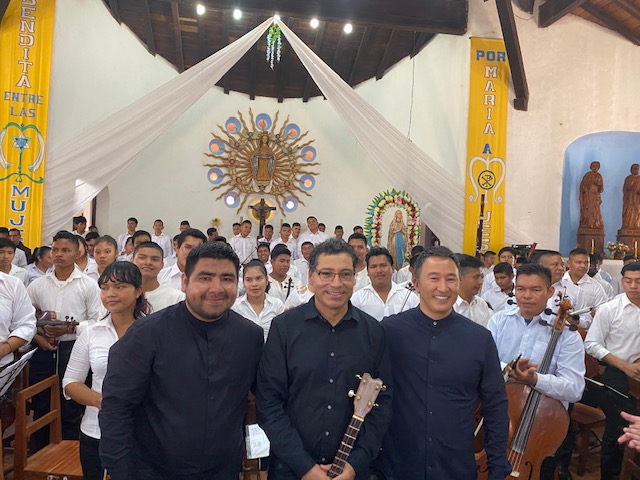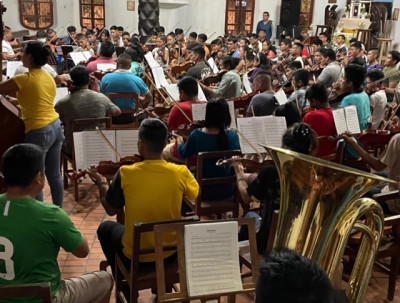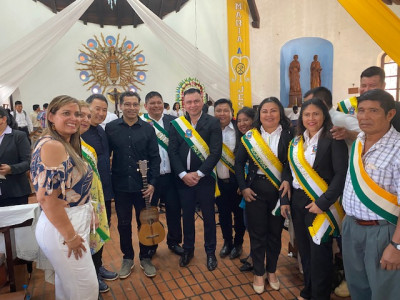Professor’s Orchestral Suite Celebrates Indigenous Culture in Bolivia
Freddy Vilches, associate professor of Hispanic studies, composed a Latin American suite to help commemorate the 160th anniversary of Urubichá, Bolivia. In August, he traveled to the Bolivian town for a live performance, along with L&C orchestra director and Urubichá guest conductor Lance Inouye.

by Gabe Korer BA ’23
Associate Professor of Hispanic Studies Freddy Vilches was recently invited to Urubichá, Bolivia, by the Urubichá Orchestra, which featured one of his musical compositions in their concert to commemorate the town’s 160th anniversary.
Urubichá is situated near the Bolivian Amazon, with a rich musical tradition and an Indigenous population of Guarayo ancestry. Vilches, who traveled to Bolivia alongside Associate Professor of Music and Director of Orchestral Activities Lance Inouye, says his work was meant as a tribute to the great cultural diversity in Latin America.
“I composed a Latin American suite, which consists of five movements,” Vilches said. “So of those five moments, the local orchestra picked two movements they wanted to perform. The significance of this is that this suite I wrote is precisely a piece to celebrate and vindicate different cultures throughout Latin America.”
Initially, Vilches worked with the Chilean Consulate to organize a concert in La Paz, Bolivia. However, he eventually decided to collaborate with the Uribichá Orchestra due to their role in preserving Indigenous culture.
“My work was going to be performed by the official, professional Bolivian orchestra,” Vilches said. “But to me, it ended up being better that an Indigenous community chose to play my music.”
A Vibrant Community
Inouye accompanied Viches on the trip, serving as a guest conductor for two of the movements within Vilches’s Latin American suite. Inouye also provided the orchestral arrangement for one of the pieces, titled “Valse Nuevo.” He says he was surprised by the orchestra’s level of community involvement.
“I didn’t quite know what to expect, but when I got there, it was so incredible,” Inouye said. “The town is just steeped in music—everyone in the whole town seems to play multiple instruments. They start playing when they’re really young.”

Urubichá’s festival is an especially lively affair, as it takes place over the course of several days beginning on August 2. With a joyful atmosphere consisting of food, games, and music, the town fostered a welcoming environment that both Inouye and Vilches were delighted to be a part of.
“Because Urubichá is a small town, every family had somebody involved in the orchestra. I felt like we were touching the lives of many people, and vice versa.”
Video recording of Freddy Vilches’s “En la Llanura,” performed by the Lewis & Clark Orchestra in 2019. This same piece was performed in Urubichá.
Strong Musical Traditions
Vilches notes that there is a strong orchestral tradition in this part of Bolivia, which he traces back to the emergence of baroque music in the 17th and 18th centuries. The musical legacy of the town’s Indigenous citizens was passed down orally through the centuries, up until the 1990s when thousands of pages of manuscripts and scores from the colonization era were recovered in the nearby municipality of Maxos.
“In Urubichá, I think it was the early ’90s when they started the orchestra,” Vilches said. “Ever since then, they have become one of the area towns where orchestral music is played the most.”
Referring to his own musical background, Vilches said that he is not trained classically, but was able to cultivate his skills with a hands-on approach.
“I got started in music when I was very young in Chile, playing native instruments from South America—the quena flute, the single bamboo flute, and panpipes. I always played traditional music,” Vilches said. “Later on, I studied a little bit of classical guitar. Then I studied Cuban percussion in Cuba, and I started learning more about Brazilian jazz and salsa music. When I moved to the States to go to college, I was fortunate enough to play in a couple bands that performed music from all over Latin America.”
Return Visits Planned

More information about Vilches’s music, including upcoming projects, performances, and ensembles, can be found on his website, freddyvilches.com.
More Stories

Experiential Learning
Health + Humanities Internships = Impact
The Center for Community and Global Health offers funding for health and humanities internships with Portland-area partners. Whether over the summer or during the school year, L&C students benefit from paid internships that turn career exploration into action.

Community Connections
“Art at the Center”
The Lewis & Clark Art Therapy program has released a documentary film exploring its expansion into the Community Counseling Center and discussing the benefits that the new space has to offer to both graduate students and community members alike.

Dialogue Across Difference
A Forum for Dialogue and Discussion on Palestine and Israel
The Middle East and North African Studies program offered a new course this fall to facilitate discussion and collective learning around the ongoing Israeli-Palestinian conflict.

Climate Justice
Uncovering the Hidden Toll of Natural Disasters
Rachel Young BA ’11 recently published groundbreaking research in the journal Nature on the long-term health impact of tropical cyclones. The article is part of her growing scholarship on the quantifiable social effects of climate change and natural hazards.
